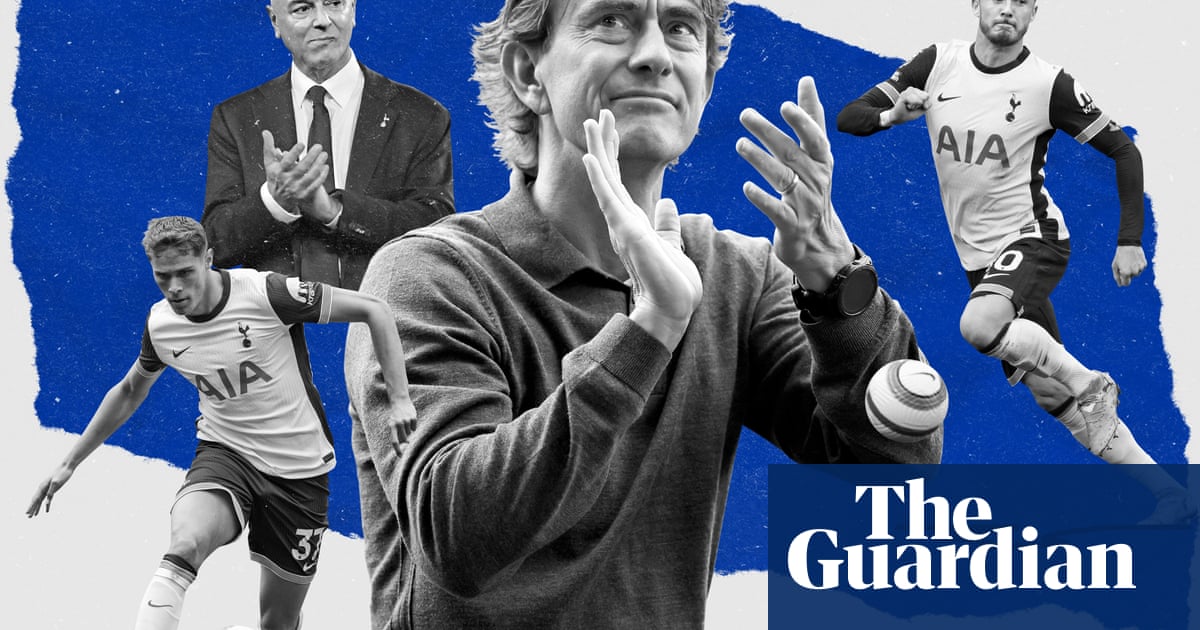Early in Ange Postecoglou’s reign, Spurs fans chanted: “We’ve got our Tottenham back.” The Australian departed as a cult hero after aEuropa League triumphbut in Bilbao his team had played nothing like the “glory game” of club lore, instead hanging on for dear life. And that was a marked improvement on the sludge served up at the Tottenham Hotspur Stadium, amid 22 Premier League defeats. Is Thomas Frank the manager to return Spurs to the days of Bill Nicholson or Keith Burkinshaw? With the right players and a trailing wind, it’s not impossible. Before promotion to the Premier League, Frank’s Brentford played an attractive hybrid passing and pressing game, only to readjust to the division above with a style that at first seemed agricultural, a playing of the margins, though one that embraced attack rather than defence as the means of survival. Frank does not shun creative players; Christian Eriksen’s signing in January 2022 was a masterstroke, while Mikkel Damsgaard’s awkward running belies a playmaker of high quality and high output. Last season, Bryan Mbeumo, Yoane Wissa and Kevin Schade were in double figures for Premier League goals. No other team attacked with such fearlessness.
The key to survival – and path to the exit – at Spurs is the chair and minority shareholder, Daniel Levy. Postecoglou is no political animal, rarely rocking the boat. Instead, his team’s results meant Levy’s name was taken in vain, particularly among away fans. Hopes of Levy taking his ball home are unlikely to be fulfilled in the near future and a new executive structure is in place. Levy’s long-serving adjutant Donna Cullen, the executive director, has departed. Incoming as the chief executive is Vinai Venkatesham, credited as the brains behind Arsenal’s post-Wenger rebirth. Another departure is that of Postecolgou’s compatriot Scott Munn as chief football officer. Spurs have a far more corporate outlook than the family atmosphere atBrentford, though the latter are a well-structured, model club with Matthew Benham as a similarly pre-eminent principal. Benham was happy for Frank to be the charismatic frontman for the club in the style of Jürgen Klopp. The Dane is collegiate and worked closely with Phil Giles, Brentford’s highly regarded director of football. Frank was also open to analytics – Benham’s specialism – as a useful means to an end. Efforts to get Levy to spend are the rocks on which many Spurs managers’ hopes have dashed. Finances are healthy, too. Can the new regime get that Champions League revenue spent on a comprehensive rebuild? That may be beyond Frank’s pay grade.
Frank will need self-belief and equilibrium to cope with his new job’s higher pressures. For all his alpha-male quips, Postecoglou was more shy than brash. In his second season an irritation with his media workload was painfully apparent. “Big Ange” was bored of repeating himself, though suffered for a lack of variety in his responses. Staring into the floor often suggested a lack of conviction in an idealism he would abandon. Frank has an inmate pragmatism and is a very quotable media performer, even-tempered and patient, happy to answer the lowest-level queries with grace. He will, though, occasionally show off the steel his players doubtless often feel. The overriding quality that kept Brentford in the Premier League was the Dane’s relentless competitive nature. Bringing Tottenham sustained success will demand that quality in spades. It has been absent for far too long.
An ability to improve players beyond expected capabilities was hugely important to Brentford. Take Keane Lewis-Potter, signed from Hull as a forward but converted into a speedy, now coveted left-back/wing-back. Can Frank’s man-management motivate Tottenham’s squad, larger and full of players who may feel they have less to prove? A Champions League schedule, eight games minimum, will reduce Frank’s time on the training pitch but offers more leeway than the Thursday-Sunday treadmill that unbalanced last season’s Premier League campaign. There is real talent within the squad, especially in the teenagers Archie Gray and Lucas Bergvall, though they need protection from burnout. James Maddison, occasionally brilliant for Postecoglou, often inconsistent, can be indulged, though every player under Frank is asked to give everything. Brentford players made 5,500 sprints last season, compared with Spurs’ 6,250, towards the top of the Premier League, but nowhere near as onerously or damagingly. Tottenham finished third in physioroom.com’send-of-season injury tablewith 22, while Brentford were 14th with 12.
Frank was not without injury problems last season. He spent much of the first half of the campaign without first-choice defenders and so opted for an all-out-attack approach. Brentford developed a regular habit of scoring goals in the opening seconds, catching opponents cold. Stopping Spurs conceding goals is a time-honoured, decades-stretching task but Postecoglou’s teams were desperately weak on set pieces, a key strength for Brentford, England’s finishing school for set-piece coaches. If Micky van de Ven and Cristian Romero stay fit and can be retained – Atlético Madrid want the Argentinian – Frank has a high-class central pairing, but the discipline and organisation of those around them must improve.
